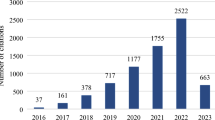Abstract
The current paper focuses on a multiobjective linear programming problem with interval objective functions coefficients. Taking into account the minimax regret criterion, an attempt is being made to propose a new solution i.e. minimax regret solution. With respect to its properties, a minimax regret solution is necessarily ideal when a necessarily ideal solution exists; otherwise it is still considered a possibly weak efficient solution. In order to obtain a minimax regret solution, an algorithm based on a relaxation procedure is suggested. A numerical example demonstrates the validity and strengths of the proposed algorithm. Finally, two special cases are investigated: the minimax regret solution for fixed objective functions coefficients as well as the minimax regret solution with a reference point. Some of the characteristic features of both cases are highlighted thereafter.
Similar content being viewed by others
References
Bazaraa MS, Sherali HD, Shetty CM (2006) Nonlinear programming: theory and algorithms. 3rd Edn. Wiley, New Jersey
Bazaraa MS, Jarvis JJ (2010) Linear programming and network flows. 4th Edn. Wiley, New Jersey
Birge JR, Louveaux F (1993) Introduction to stochastic programming. Physica-Verlag, New York
Bitran GR (1980) Linear multiobjective problems with interval coefficients. Manag Sci 26: 694–706
Das SK, Goswami A, Alam SS (1999) Multiobjective transportation problem with interval cost, source and destination parameters. Eur J Oper Res 117: 100–112
Dong C, Huang GH, Cai YP, Xu Y (2011) An interval-parameter minimax regret programming approach for power management systems planning under uncertainty. Appl Energy 88: 2835–2845
Ehrgott M (2005) Multicriteria optimization. 2nd Edn. Springer, Berlin
Feidler M, Nedoma J, Ramik J, Rohn J, Zimmermann K (2006) Linear optimization problems with inexact data. Springer, Berlin
Giove S, Funari S, Nardelli C (2006) An interval portfolio selection problem based on regret function. Eur J Oper Res 170: 253–264
Hladík M (2008) Tolerances in portfolio selection via interval linear programming. In: Proceedings of the 26th international conference on mathematical methods in economics, MME08, pp 185–191
Hladík M (2010) On necessarily efficient solutions in interval multiobjective linear programming, In: Proceedings of the 25th Mini-EURO conference on uncertainty and robustness in planning and decision making, URPDM 2010, pp 1–10
Ida M., Generation of efficient solutions for multiobjective linear programming with interval coefficients. In: Proceedings of the SICE annual conference, SICE’96, pp 1041–1044
Ida M (1999) Necessary efficient test in interval multiobjective linear programming. In: Proceedings of the eighth international fuzzy systems association world congress, pp 500–504
Ida M (2003) Portfolio selection problem with interval coefficients. Appl Math Lett 16: 709–713
Ida M (2004) Solutions for the portfolio selection problem with interval and fuzzy coefficients. Reliab Comput 10: 389–400
Inuiguchi M, Kume Y (1991) Goal programming problems with interval coefficients and target intervals. Eur J Oper Res 52: 345–360
Inuiguchi M, Sakawa M (1995) Minimax regret solution to linear programming problems with an interval objective function. Eur J Oper Res 86: 526–536
Inuiguchi M, Sakawa M (1996) Possible and necessary efficiency in possibilistic multiobjective linear programming problems and possible efficiency test. Fuzzy Sets Syst 78: 321–341
Inuiguchi M, Higashitani H, Tanino T (1999) On computation methods of the minimax regret solution for linear programming problems with uncertain objective function coefficients. In: Proceedings of IEEE international conference, pp 979–984
Lai KK, Wang SY, Xu JP, Zho SS, Fang Y (2002) A class of linear interval programming problems and its application to portfolio selection. IEEE Trans Fuzzy Syst 10: 698–704
Lai Y-J, Hwang C-L (1996) Fuzzy multiple objective decision making: methods and applications, Lecture Notes in Economics and Mathematical Systems, vol 404. Springer, Berlin
Loulou R, Kanudia A (1999) Minimax regret strategies for greenhouse gas abatement: methodology and application. Oper Res Lett 25: 219–230
Mausser HE, Laguna M (1998) A new mixed integer formulation for the maximum regret problem. Int Trans Oper Res 5: 389–403
Oliveira C, Antunes CH (2007) Multiple objective linear programming models with interval coefficients—an illustrative overview. Eur J Oper Res 181: 1434–1463
Oliveira C, Antunes CH (2009) An interactive method of tackling uncertainty in interval multiple objective linear programming. J Math Sci 161: 854–866
Prókopa A (1995) Stochastic programming. Kluwer, Boston
Sakawa M (1993) Fuzzy sets and interactive multiobjective optimization. Plenum Press, New York
Savage LJ (1951) The theory of statistical decision. J Am Stat Assoc 46: 55–67
Shimizu K, Aiyoshi E (1980) Necessary conditions for min-max problems and algorithms by a relaxation procedure. IEEE Trans Automat Control AC-25: 62–66
Urli B, Nadeau R (1992) An interactive method to multiobjective linear programming problems with interval coefficients. INFOR 30: 127–137
Wang ML, Wang HF (2001) Interval analysis of a fuzzy multiobjective linear programming. Int J Fuzzy Syst 34: 558–568
Wierzbicki AP (1982) A mathematical basis for satisficing decision making. Math Model 3: 391–405
Wu HC (2009) The Karush-Kuhn-Tucker optimality conditions in multiobjective programming problems with interval-valued objective functions. Eur J Oper Res 196: 49–60
Author information
Authors and Affiliations
Corresponding author
Rights and permissions
About this article
Cite this article
Rivaz, S., Yaghoobi, M.A. Minimax regret solution to multiobjective linear programming problems with interval objective functions coefficients. Cent Eur J Oper Res 21, 625–649 (2013). https://doi.org/10.1007/s10100-012-0252-9
Published:
Issue Date:
DOI: https://doi.org/10.1007/s10100-012-0252-9




